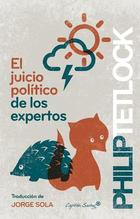ntelligence failures around the invasion of Iraq dramatically illustrate the need to develop standards for evaluating expert opinion. In this study, Tetlock explores what constitutes good judgment in predicting future events, looking at why expert forecasts are often so poor. Over more than two decades he carried out a record that included some 82,000 forecasts from 284 experts. The result? Predictions were, on average, slightly more accurate than random assumptions, but the marketplace does not eliminate bad experts because, in part, there is no accountability.
Based on the famous distinction between "foxes" and "hedgehogs" by the philosopher Isaiah Berlin, Tetlock considers hedgehogs prone to a limited and coherent view of the world from firm ideological convictions. Foxes, however, have the ability to adjust their opinions, they are more cautious, pragmatic, tending to doubt...read more









